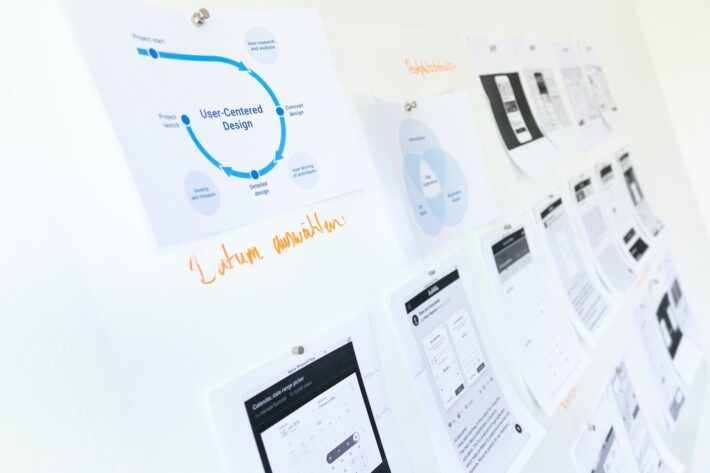Enhancing Website Design with AI: Revolutionizing User Experience

Hey there, fellow website enthusiasts! Welcome to my blog, where I’m going to dive deep into the exciting world of enhancing website design with AI. In this post, we’ll explore how revolutionary AI technologies are transforming user experience and revolutionizing the way we design websites. So, fasten your seatbelts and get ready to embark on this exhilarating journey with me!
Table of Contents
- Understanding AI in Website Design
- The Role of AI in Enhancing User Experience
- Leveraging AI for Personalization
- Optimizing Website Navigation with AI
- AI-powered Chatbots for Customer Engagement
- AI-driven Analytics for Improved Decision Making
- Overcoming Challenges and Concerns with AI in Website Design
- Frequently Asked Questions (FAQ)
- Conclusion
1. Understanding AI in Website Design
Let’s kick things off by exploring what exactly AI is in the context of website design. AI, or Artificial Intelligence, refers to the simulation of human intelligence in machines that are programmed to think and learn like humans. When it comes to website design, AI can be harnessed to analyze vast amounts of data, make informed decisions, and create personalized user experiences.
In the realm of website design, AI can be utilized to automate various tasks such as content generation, layout optimization, and even user testing. By employing AI-powered algorithms, designers can save time and effort, allowing them to focus on more creative aspects of the design process.
2. The Role of AI in Enhancing User Experience
User experience (UX) plays a pivotal role in determining the success of a website. With AI, designers can take UX to a whole new level. AI algorithms can analyze user behavior, preferences, and demographics to create personalized experiences tailored to each individual visitor. By understanding user intent and adapting the website accordingly, AI can make the browsing experience more intuitive and engaging.
One of the key ways AI enhances UX is through intelligent content recommendations. By utilizing machine learning algorithms, websites can suggest relevant content based on the user’s past behavior, increasing the likelihood of them finding what they’re looking for. This not only improves user satisfaction but also boosts conversions and overall website performance.
3. Leveraging AI for Personalization
Personalization is the secret ingredient that can turn a mediocre website into an extraordinary one. AI enables designers to create dynamic websites that adapt to each user’s preferences and needs. By analyzing user data, AI can deliver personalized content, offers, and recommendations in real-time.
For instance, imagine a clothing website that uses AI to analyze a user’s browsing history, purchase behavior, and even social media activity. Based on this data, the website can display personalized clothing suggestions tailored to the user’s style, size, and budget. This level of personalization not only enhances the user experience but also increases the chances of conversion and customer loyalty.
4. Optimizing Website Navigation with AI
Navigation is a critical aspect of website design. A well-designed navigation system ensures that users can easily find the information they’re looking for, leading to a positive user experience. AI can play a significant role in optimizing website navigation by analyzing user behavior and preferences.
By implementing AI-powered algorithms, websites can dynamically adjust their navigation menus based on user interactions. For example, if a user frequently clicks on a specific category or searches for particular keywords, the AI can prioritize those options in the navigation menu. This adaptive navigation approach improves user satisfaction, reduces bounce rates, and increases the chances of users finding what they need.
Additionally, AI can also assist in the design of intuitive and user-friendly navigation interfaces. By analyzing user interactions and feedback, AI algorithms can identify areas of improvement and suggest design modifications that enhance usability.
5. AI-powered Chatbots for Customer Engagement
Customer engagement is a vital aspect of any business website. AI-powered chatbots have emerged as a game-changer in this realm. These intelligent virtual assistants can interact with users, answer their queries, and even perform tasks like processing orders or scheduling appointments.
Chatbots leverage natural language processing (NLP) and machine learning algorithms to understand user inquiries and provide accurate responses. They can handle multiple conversations simultaneously and learn from each interaction, becoming smarter and more efficient over time.
By incorporating AI-powered chatbots into websites, businesses can offer round-the-clock customer support, improve response times, and enhance overall customer satisfaction. Chatbots also free up human resources, allowing businesses to allocate their workforce to more complex tasks.
6. AI-driven Analytics for Improved Decision Making
In the world of website design, data is king. AI-driven analytics provides designers and marketers with valuable insights that can shape decision making and drive success. By analyzing vast amounts of data, AI algorithms can identify patterns, trends, and correlations that humans might overlook.
AI-powered analytics can help designers understand user behavior, identify areas of improvement, and make data-driven design decisions. By tracking user interactions, heatmaps, and conversion rates, designers can fine-tune their websites for optimal performance.
Furthermore, AI analytics can also assist in split testing and A/B testing, allowing designers to compare different design variations and determine which ones yield the best results. These insights enable designers to optimize their websites and continuously improve the user experience.
7. Overcoming Challenges and Concerns with AI in Website Design
While AI brings a multitude of benefits to website design, it’s essential to address the challenges and concerns associated with its implementation. One of the primary concerns is the potential loss of human touch and creativity in the design process. However, AI should be viewed as a tool that amplifies human capabilities rather than replacing them. Designers can leverage AI to automate repetitive tasks and focus on more innovative aspects of design.
Another challenge is the ethical use of AI. Designers must ensure that AI algorithms are unbiased and do not discriminate against certain user groups. Transparency and accountability are crucial when implementing AI in website design.
Additionally, data privacy and security are major concerns. Designers must ensure that user data is collected and stored securely, and user consent is obtained before using their data for AI-driven personalization.
Frequently Asked Questions (FAQ)
Q: Will AI make web designers obsolete?
A: Absolutely not! AI is here to assist designers, not replace them. Designers will still play a critical role in shaping the overall aesthetic and creative aspects of websites.
Q: Can AI make websites load faster?
A: Yes, AI can optimize website performance by analyzing and compressing images, caching data, and leveraging content delivery networks (CDNs) to reduce latency.
Q: Are AI-powered chatbots capable of understanding complex queries?
A: While chatbots have limitations, advanced AI-powered chatbots can understand and respond to complex queries by leveraging natural language processing and machine learning algorithms.
Q: How can AI enhance accessibility in website design?
A: AI can analyze user behavior and preferences to create personalized accessibility options such as font size, color contrast, and screen reader compatibility.
Q: Is AI only beneficial for large businesses or can small businesses also leverage its power?
A: AI is accessible to businesses of all sizes. Many AI solutions are affordable and scalable, making them suitable for small businesses as well.
Conclusion
AI is undoubtedly revolutionizing the world of website design, transforming user experiences and empowering businesses to create personalized, intuitive, and engaging websites. By leveraging AI technologies, designers can optimize website navigation, enhance user experience, and make data-driven design decisions.
However, it’s important to approach AI implementation ethically and address concerns regarding privacy, security, and unbiased algorithms. Designers must remember that AI is a tool that augments their abilities, not a replacement.
So, embrace the power of AI and unlock the true potential of your website design. Let your creativity soar, knowing that AI has your back in streamlining processes, enhancing user experiences, and propelling your website to new heights. Happy designing!


